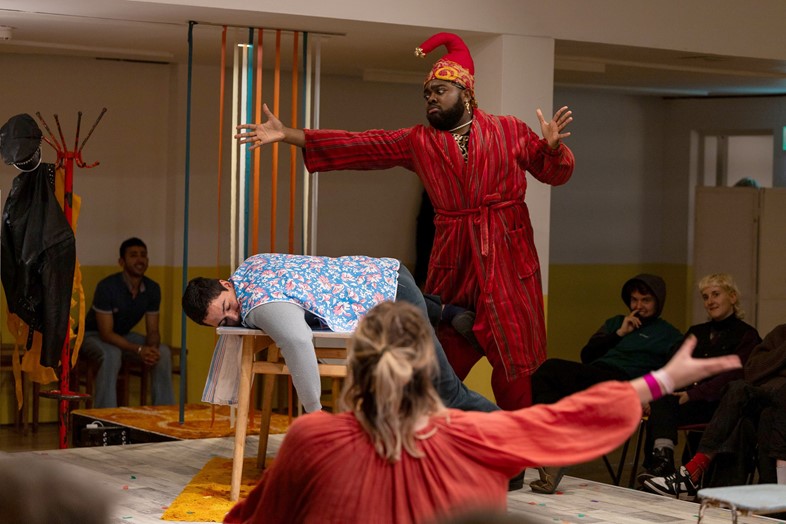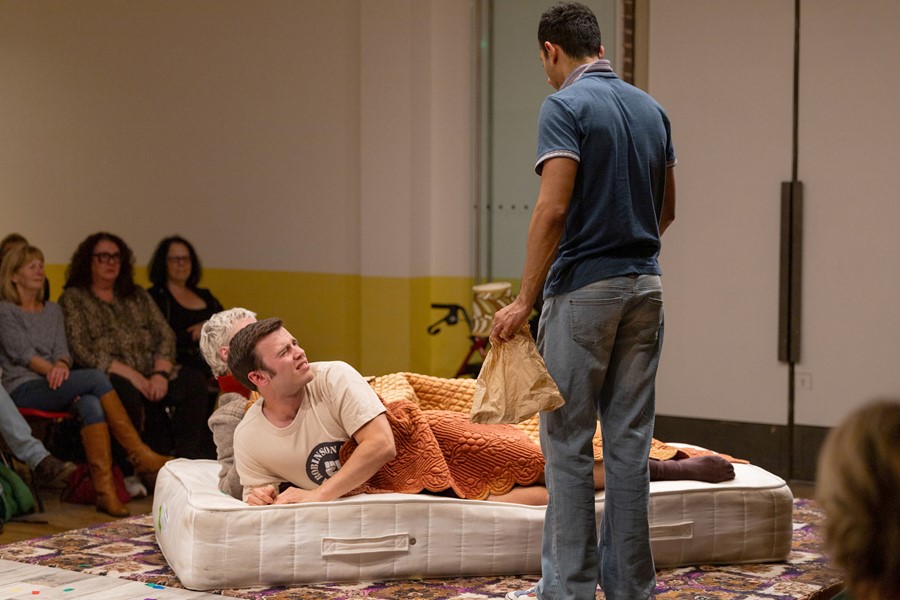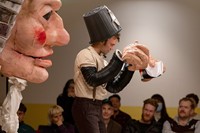Director Ian Giles and playwright Louis Rembges discuss their new production, which tells the story of a chosen family who worked together to protect their living space at a time when being out was a brave act of defiance.
It feels fitting that On Railton Road is the first theatre production to be staged at London’s Museum of the Home. On one level, it tells a fundamentally domestic story of a chosen family who worked together to protect their living space at a time when being gay, out and proud was a brave act of defiance. But on another more political level, it shines a spotlight on a radical group of activists who shrewdly used 1970s housing law to turn their interconnected squats into the Brixton Housing Co-op. Nearly 50 years later, this community organisation is still providing affordable homes for LGBTQ+ tenants squeezed harder than ever by the cost-of-living crisis.
Directed by Ian Giles and written by Louis Rembges, On Railton Road is fascinating, rambunctious and very funny. Giles happened upon the incredible story of these unsung queer heroes – and their agitprop theatre troupe, the Brixton Faeries – while looking into the 1970s activism of the Gay Liberation Front. One of the squatters, Ian Townsend, had presciently documented their way of life and theatrical brand of activism by conducting more than 700 pages of interviews with his Railton Road housemates. This rich cache of queer history is now kept in the LGBTQIA+ Archives at London’s Bishopsgate Institute.
“I was interested in that period after the decriminalisation of gay sex between men [in 1967] but before the HIV/Aids epidemic,” Giles says. “There’s this joyous moment of hope and progression for gay people in the 1970s. And this idea, which they started themselves, of saying: ‘Gay is good. I’m fine. Let’s live together.’” Giles was also struck by the bold and provocative productions the Brixton Faeries put on at the nearby Oval House Theatre and “anywhere where people didn’t want them” including local schools and old people’s homes. “They kind of used gender-fuck and quick drag to tell stories of their experiences being gay in the 1970s,” Giles explains.
Giles knew he wanted to share the squatters’ story with a wider audience, but when he first approached Rembges, a playwright he had worked with previously, they were unsure what form their production would take. “We thought that maybe we could do an exhibition with a performed monologue element, but then I wrote the first draft of what would become On Railton Road,” Rembges recalls. “And we both loved it so much that we pushed through and created this play.” When it was first staged at Brixton Community Base in 2021, it was a one-act piece, but On Railton Road now unfolds over two acts that touch on love, friendship, sex, politics and acid trips. It’s thought-provoking stuff, but also lots of fun.
Rembges says the writing process involved “a lot of streamlining”, partly because he has cleverly weaved the Brixton Faeries’ first agitprop play into his script. At the end of each scene, the cast performs an excerpt from Mr Punch’s Nuclear Family, the troupe’s witty take-down of the traditional (and very problematic) Punch and Judy puppet show. It’s not just a thrilling insight into what it might have been like to watch the Brixton Faeries, but also reminds us that grassroots art can be a formidable tool for social change. “The idea was to resurrect their script in the same way you might resurrect a Shakespeare script,” Giles says. “We really wanted to honour their playmaking.”
Though On Railton Road broadly tells the story of how the squatters gained legal control over their properties, it is not strictly biographical. “There were about 60 men who lived there over a ten-year period, and within Ian Townsend’s interviews, there were amazing nuggets of information and attitude that sparked some of the narrative,” Giles says. Rembges then moved the story forward slightly to 1979, the year Margaret Thatcher came to power, which heightens the sense of urgency given the Tory prime minister’s cruelly dismissive attitude to queer people and the idea of community as a whole. He also created eight fictional characters who “are amalgamations” of the actual gay men who lived in the squats, as well as the actors who took part in early workshops.

In the process, Rembges was able to ensure that On Railton Road represents the full spectrum of LGBTQ+ lives in 2023. “We use the word ‘queer’ now, which the Brixton squatters didn’t use, but I felt straight away that it was important for the people on stage to represent today's queer landscape,” Rembges explains. To this end, he and Giles took a gender and colour-blind approach to casting the play, which stars eight LGBTQ+ performers: Jamal Franklin, Manish Gandhi, Jaye Hudson, Nicholas Marrast-Lewis, Dan de la Motte, Thomas Royal, Aoife Smyth and Hannah van der Westhuysen. “Having so much queer knowledge in the rehearsal room has been really helpful,” Giles says. “There are people in the cast who know more about trans history than I do, so they’ve been able to say things like: ‘Actually, I don’t think this character would wear this top.’”
In many ways, Brixton’s gay squatters lived very different lives to contemporary queer people – the threat of homophobic violence was even more prevalent, as we see in an early scene. But Rembges believes there are parallels to be drawn. ”Obviously the struggles can’t be identical, and I don’t like to think of queer trauma being cyclical,” he says. “But I think what is cyclical is the experience of coming somewhere and finding people that you identify with. And making those people into a family who all support each other.” Rembges also points out that the anti-gay prejudice perpetuated by Thatcher’s regime has sinister echoes today in the way Rishi Sunak’s Conservatives are demonising trans people. “We seem to be a community of scapegoats for this government, [especially] when they’re spiralling down the plughole and about to be voted out,” he says.
Ultimately, though, On Railton Road is designed to be a galvanising and inspiring experience for audiences – especially today’s queer change-makers. “We really want to highlight our collective queer history and the amazing thing this group of people achieved by creating a community of 37 houses and a huge communal garden,” Rembges says. “It just goes to show what can we do if we work together in a non-hierarchical way.”
On Railton Road will be on at Museum of the Home until November 18, with matinee and evening performances available.






